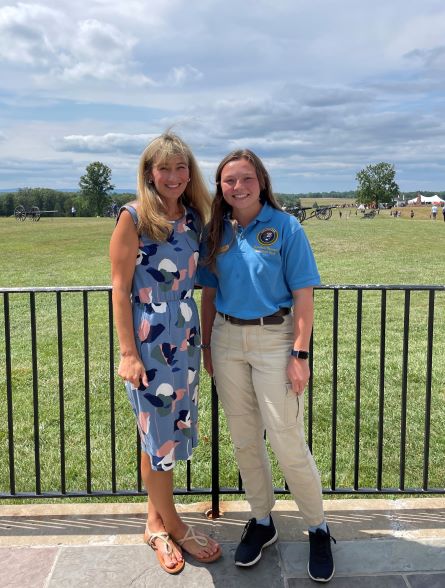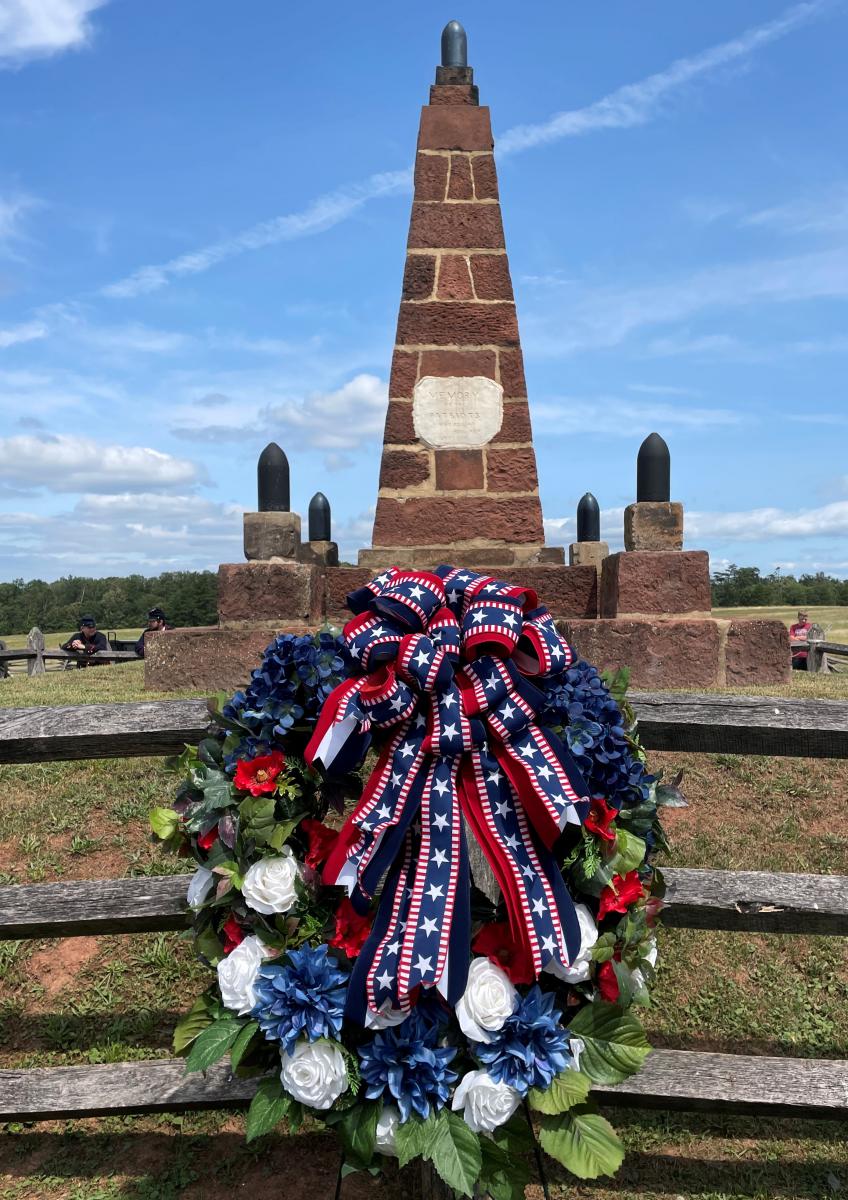Reflections from Manassas: Haley French Discusses Her Summer Internship at Manassas National Battlefield Park
by Haley French | | Thursday, September 2, 2021 - 13:43

This summer I spent twelve weeks at Manassas National Battlefield Park, learning the history of the park and battles and how to engage and interpret for visitors. When I applied for an internship through the Institute of Public History, I did not originally have Manassas as my first choice, preferring at the time an internship in a city I grew up in. That would have been a great experience, I’m sure, but my summer at Manassas NBP was exactly what I needed to take me out of my comfort zone and to show me just how many opportunities there are in history if I choose to pursue them.
Arriving in Manassas, naturally my first thought was how unprepared I was for the job. I was leaving my comfort zone not only geographically but also within history; I primarily study the 20th century and here I was on a Civil War battlefield. Our training immersed us in the history of the battles and prepared me for the job to come, but throughout the summer I also came to realize and appreciate that there will always be more to learn. While it was at first overwhelming to realize that I could read and study constantly and still not know everything, this was also exciting. We were encouraged to do our own research and reading throughout the day including looking through the archives. My discoveries made me want to investigate further. We were also taught how to conduct research to help visitors find information on ancestors who may have fought at Manassas. I was even able to conduct my own research on my family’s history using UVA and park resources to find my great-great-great grandfather who served in a North Carolina infantry regiment and was even a POW for a short period of time.
Needless to say, our two weeks of training were packed with information on the battles and park procedures. When we were not in training, on the battlefield, or in the classroom, I was fortunate to be living with my coworkers, who were extremely knowledgeable in Civil War history and interpretation. The relationships I had the pleasure of forming with my housemates and the help that they gave me in creating my tour and learning the history were indispensable for an enjoyable and productive summer. By the end of the two weeks, I had a tour outline and a working knowledge of the battlefield. Then came the fun part.
A big part of my job this summer was giving the Henry Hill program, a tour covering the First Battle of Manassas. I have never been a strong public speaker, but I love talking about history and explaining what happened and why it is still worth learning about. I really enjoyed giving tours for this reason and found that I not only improved in public speaking, but I looked forward to large tour groups. Tours usually center around a theme that can connect visitors to the history and can help narrow down which aspects of the battle to focus on. In training, we received a full-day First Manassas tour, and we now had to pare that down to about forty minutes. My tour began by discussing the optimism held by both the respective US and Confederate governments and their citizens that the war would be brief and easy. I then focused on the common soldier experiencing military life and battle for the first time. We discussed the reasons these men volunteered, from those who may have felt an obligation to fight for their country or pressure from family members and friends to enlist. Some sought glory on the battlefield or a chance to prove themselves. Many believed what other citizens and politicians believed—that the war would be short and relatively painless and that their enemy would surely be defeated. The fighting that followed as the Union attempted to take Manassas Junction, a crucial railroad intersection a few miles from the battle, would be a rude awakening as well as hint at what would follow in the years to come. 
The First Battle of Manassas was a Union defeat ending in the army’s chaotic retreat back to D.C. Underscoring how confident and naive many citizens were about war, picnickers had come down from Washington, D.C., to witness the first battle of the war. They retreated to Washington along with their army, which they had been certain would crush the Confederates. I ended each tour by discussing how much had changed in that single day, for the soldiers as well as both the Union and the Confederate war efforts. Union soldiers during and after their retreat had time to consider what they had seen in battle, how different it was from their expectations, and fully feel the disappointment of losing to an enemy they were supposed to easily defeat. Civilians on both sides likewise saw the army marching back to D.C. or heard about it in the newspapers and letters dispersed in the days following. They, too, would be confronted with the realities of war: wounded and dead loved ones, civilian loss of life and property, and the unavoidable fact that one’s side could lose. Equally as important, debates within the Union about emancipation as a potential war aim would intensify, even as the flight of enslaved persons to Union lines escalated.
While the facts of the battle do not change, every tour is unique in some way. For instance, you might have a group that is really interested in leadership and decision-making, so you get to go into more detail there than you might otherwise. Other times you might make a few jokes to connect with an audience that might not appreciate the history as much as they can appreciate having to follow some really bad orders. By using a theme that could be understood by everyone, the visitors can comprehend and empathize with people that lived 160 years ago. After all, most of us can recall a time where something turned out to be a lot harder than what we originally thought. The look on visitors faces as they anticipate what might come next or the sigh and headshake as they begin to empathize with the soldiers who fought at Manassas 160 years ago was the single most rewarding part of the summer. That was why I chose to work Manassas NBP—to talk with people and make the complex digestible.
By the end of the summer, I learned more than just what happened during and after the battle. I learned about the National Park Service and future careers interpreting at different sites around the country. I learned how to connect visitors to things that happened so long ago that it is hard to even picture. I did my own research, diving into a topic I did not know much about and even discovered a family member’s story. Above all, I learned that leaving my comfort zone can really pay off. Without the generosity and help of many people, this experience would not have been possible so thank you to everyone involved in the process and funding of this internship.
